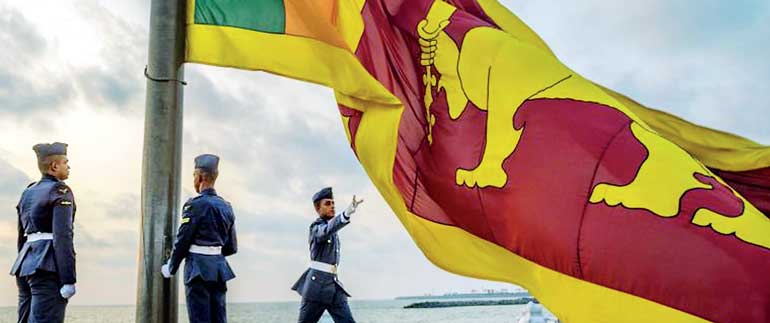Tuesday Feb 17, 2026
Tuesday Feb 17, 2026
Monday, 5 February 2018 00:00 - - {{hitsCtrl.values.hits}}

By Jayasri Priyalal
The dust would have settled by now, having celebrated the 70th anniversary of the independence of Sri Lanka. In many Independence Day speeches, I guess the manner in which then-Ceylon gained independence without shedding even a drop of blood would have been spoken about and admired.
I am of the view that this is not a true patriotic statement as it undermines the great heroic sacrifices of our forefathers to seek freedom from foreign rulers. Let us not only limit our history to the imperialistic hegemony of the Western naval powers since the 16th century. Sri Lanka was subject to various foreign invaders, particularly from Southern India, for centuries.
As a nation, we have stood fast and successfully defeated those threats and maintained the current unitary state of the island nation. Moreover, it is also important that we do not degrade the great civilisation of this Island on par with many others as documented in recorded history.
The existence of iconic historical artifacts functioning till date, contributing to the wellbeing of the community in a most eco-friendly manner, is proof of that past glorified history.
A unique irrigation system is one amongst many in the world still in operation feeding the paddy fields in Rajarata built with a satellite network tank system. The magnanimous humane rulers then never waged ethnic cleansing or genocides on the foreign invaders' armies when the conquerors were defeated.
None of the foreign mercenaries were imprisoned as prisoners of war or taken as slaves, as one could find after World War I and II – the infamous holocaust and gas chambers - in other parts of the world. But many of the enemy rulers’ army were permitted to live in human sanctuaries on the island, respecting their right to live with compassion, even though they had been soldiers of the enemy army.
The source of these good governance principles could be found on stone pillars erected by the Great Emperor Asoka (272 to 231 BC) and known as edicts inscribed by the emperor following his conversion to Buddhism.
Emperor Asoka took great strides to spread Buddhism in many parts of the world that reached as far as the Mediterranean. The emperor chose his son Arahat Mihindu and daughter Sangamitta as the emissaries to Lanka to spread Buddhism along with his moral and religious precepts, social and animal welfare program as the first code of conduct for good governance. Hence one could say this magnanimous humane rule was inherited in the DNA of rulers of Lanka in line with the principles of social and moral precepts rather than religious practices or the philosophical dimension of Buddhism.
In this Asian century an intellectual study should be initiated to learn as to how the Asian civilisation has evolved with the influence of various philosophies originating from Asia.
A study of this nature is urgent and important as a necessity to learn from the past and guide future-ready leaders as to how the 21st Century should progress and be shaped towards the sustainable development goals founded on principles of shared prosperity.
Having gained freedom from the imperial and colonial powers, many Asian countries are still grappling to reap the benefits of true independence, taking a huge toll on lives due to the unending violence unleashed by the marginalised living without hope and help and many being misaligned with extremist ideologies in many parts of Asia.
(The writer is the Regional Director of UNI Apro Finance, Professional and Managers Group)